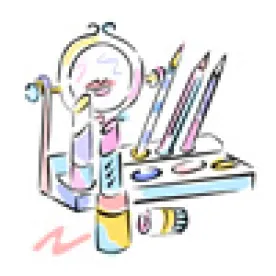L’Oreal launched its Makeup Genius app earlier this year. It’s been lauded as one of the best attempts at enabling users to apply make-up virtually, through a smartphone or other device. This has prompted a number of market observers to ask whether the colour cosmetics industry is on the cusp of a digital revolution, and if apps like L’Oreal’s have the potential to cause a surge in online sales.
L’Oreal’s app attempts to avert an age-old problem for cosmetics consumers and brands alike: the fact that consumers want to try before they buy. Makeup Genius offers the chance to try over 300 products and a number of stylist authenticated looks, at an instance. The app scans the user’s face and applies digital make-up to it, working in real-time to respond to changes in the user’s location and facial expression. It relies on the same technology used in the 2008 film The Curious Case of Benjamin Button in which Brad Pitt undergoes a number of virtual age transformations. But L’Oreal is not the only one. ModiFace, a developer of several related technologies, has created its own make-up mirror, which it has licensed to a number of brands. In addition to its Looking Glass app, it has pioneered the use of in-store make-up mirrors in conjunction with Sephora and Covergirl.
Colour cosmetics is a highly successful industry by market value. A 2013 report by Credit Suisse values the industry globally at $55bn, and a recent report from Mintel, an independent market research firm, puts a £1.5bn valuation on the UK colour cosmetics industry alone. But, commentators observe that it’s been unable to capitalise on the growth of online sales. The main reason for this is that consumers want to try before they are often unable to return a product if it is unsuitable. Yet the growth in online sales would seem too good an opportunity to miss. Forrester predicts that the European online retail sales market will grow at approximately 12% until 2018.
Naturally, virtual make-up mirror apps have the potential to drive online sales, for example, through links to online stores. But they could also increase traditional brick and mortar sales. As L’Oreal’s Chairman and CEO Jean-Paul Agon mentioned in an interview with the Financial Times: “our consumers can try out the products they might not otherwise have tested or considered.” Digital make-up mirror apps can also build and increase brand loyalty and connect with users.
The reported downside is that no matter how precise make-up mirrors are, they don’t provide the human element, meaning that beauty counter specialists, and the expertise they provide, are by no means redundant. In fact, there may be synergies. Such specialists could use virtual mirrors to serve more customers at once, provide expert advice, and help customers make marginal decisions between products. Luxury brands have also started experimenting in the digital space in an attempt to enhance customer experience. YSL recently struck a deal with Google to use its Google Glass at its beauty counters. These will enable stylists to record the make-up application process and send a recording to the customer for future reference.
Colour cosmetics brands are embracing digital with a hope to revolutionise the cosmetics purchasing experience, both online and in-store. CovBrands will certainly be looking to see what happens in this space.




 />i
/>i
